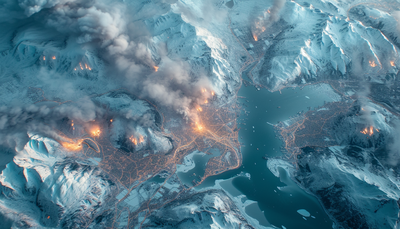Gothic War (GD)
| Gothic War | |||||||
|---|---|---|---|---|---|---|---|
 A burning Drasdag, under siege in MC 2029. | |||||||
| |||||||
| Belligerents | |||||||
| The Golden Throne | Scandinvan Empire, Theohuanacan Pirates | ||||||
The Gothic War, MC 2026-30 , was a major military conflict primarily fought between the forces of the Golden Throne and the Scandinvan Empire. Although the war began in Theohuanacu after the instigation of a rebellion by the Scandinvans, the fighting quickly spread to Nicaro and Scandinvan-territory in Gholgoth after both countries suffered largescale armed invasions by the Golden Throne. The war ended in MC April 2030, with the signing of an alliance between the two warring powers in exchange for an end to the Scandinvan slave trade in Greater Dienstad and the complete withdrawal of Macabéan forces from Gholgoth.
Prelude to War
- Written section on history between MC 2000-10 moved to Theohuanacu article. Shorter version here.
- The Golden Throne invaded and occupied Theohuanacu in the aftermath of the War of Golden Succession, as an early move in its cold war with Stevid. This includes the occupation of Tarn(?).
- Initially the western and southeastern cities were left to their own devices in return for contributions to the Imperial Levy (taxes) on Theohuanacu.
- Two rebellions between occupation and Gothic War are crushed, leading to the imperial reorganization of Tlaloc. Palenque and Tiwanaku left as the center of the slave trade in central Greater Dienstad.
- Palenque and Tiwanaku earn large revenues selling luxury slaves to the Scandinvan Empire.
- Scandinvan Empire lends financial and material aid to a rebellion in southeastern Theohuanacu against the Golden Throne, hoping to corner the luxury slave trade market.
Rebellion in Theohuanacu
Siege of Tiwanaku
Siege of Palenque
Tlaloc Terror Attack
Invasion of Drana
Military Preperations
Diplomatic Preperations
The Initial Landings
Invasion of Nicaro
Pirates, Drug Lords, and Fascists
The Invasion
Siege of Chinadenga
Aftermath
Economic Consequences of the War
- The growth of Macabéan bases in Mokastana and Haishan flooded these countries with money. Although the number of forces deployed in these countries fell drastically, some bases remain and one of the consequences of the war are the new economic connections between the Golden Throne, Mokastana, and Haishan.
- The Imperial Bureaucracy of the Golden Throne accumulated enormous debts to pay for the war, leading to an increase in taxation and largescale public land auctions as a means to balance the Macabéan treasury.
Death Toll
- Scandivan estimates for Scandinvan deaths: 0.75% (30 million) to 1% (40 million) of total population. Est. 4/5s were military deaths (24 to 32 million).
- Macabéan war deaths in Drana: ~25 million (1/40).
- Macabéan war casualties in Nicaro: ~6,000
- Macabéan war casualties in Theohuanacu: ~20-30,000.
- Nicaroan dead: ~200,000
- Theohuanacan dead: ~500,000-2.5 million
Conterversies
Chemical Weapons
- Use of sarin gas on Macabéan troops: "It was sarin gas that had been used."
Space-Based Weapons
- Macabéan use of 'god rods' against Palenque and Tiwanaku highly criticized by international community.